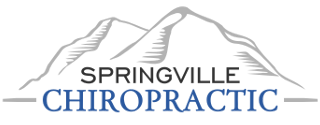FAQs
Here are frequently asked questions about chiropractic, functional medicine, and frozen shoulder treatments.
1. What services do you provide at Springville Chiropractic?
Chiropractic Care Functional Medicine Nutrition Frozen Shoulder Treatments
2. What is Chiropractic?
Chiropractic is a form of treatment that is used to treat musculoskeletal conditions such as back pain, neck pain, shoulder pain, headaches, hip pain and knee pain. Chiropractic treatments often involve adjustments of the spine in areas where the bones are misaligned, stuck, or moving improperly. When the vertebrae are again moving properly, the irritation caused by the misaligned bone goes away and the patient's condition often improves. Treatments are commonly done by hand, but with occasion are done using a mechanical device.
3. Are chiropractic treatments effective?
Yes. Studies over the recent years have shown that is quite effective in improving lower back pain, headaches, neck pain, and other areas of the spine and body.
4. Is chiropractic safe?
Chiropractors have been trained in the assessment and treatment of many different musculoskeletal conditions. While there is some inherent risk in any health treatment, there is little danger associated with chiropractic treatments. In fact, when a patient uses chiropractic treatments, their risk of an adverse event happening is reduced because the need to use prescription drugs and surgery is less.
5. Do Chiropractic Treatments Hurt?
Sometimes there may be some discomfort, with a chiropractic treatment, when the individual being treated is in a great deal of pain. The treatments will be changed to meet each person's pain level and their comfort level.
6. What is Functional Medicine?
Functional Medicine is a method of treatment that addresses the whole person. Through functional medicine we attempt to treat the root cause of illnesses instead of just managing the symptoms. We focus on improving the physiological function of each patient's body by first finding the specific areas of physiology that are not working optimally for that patient. We then try to find out “why” each of these specific physiological dysfunctions are occurring. We do this by analyzing the patient's:
Stress levels Diet/ Nutrition
Digestive Function Environmental Factors/ Toxins
Hormonal levels/ Hormonal balances Sugar handling issues
Mitochondrial Function Patient's Lifestyle
Genetic factors Adrenal gland function
and other factors
7. Who can benefit from Functional Medicine?
Any person that wants an improvement in how their body is functioning can benefit from functional medicine. Functional medicine can particularly help those conditions that are chronic and difficult to treat, such as: thryroid disorders, autoimmune conditions, irritable bowel syndrome, high cholesterol, diabetes, indigestion, crohn's disease, autism and others. If you have questions if your condition could be helped, feel free to ask us.
8. What should I expect on my first Functional Medicine visit?
Prior to your appointment, we will need to have received your completed functional medicine intake from and your health records from other doctors that you have seen for the same condition. This will allow Dr. Olson to be able to review your case before meeting with you. Your first visit will last about 1 to 1 ½ hours. During this time Dr. Olson will perform a physical exam, discuss your medical history, and relate to you the possible causes of your symptoms and health issues. Recommendations may be given on this first visit. Further testing such as blood tests or other specialized diagnostic tests will often be requested to further assess your health condition. Your next appointment will be scheduled approximately from 1 to 3 weeks to discuss the results of the the further studies performed and to give you recommendations on your diet, lifestyle modifications, and supplements. Follow up visits will be scheduled in 3 to 8 weeks depending on your condition and the types of treatments that have been recommended.
9. What makes your Frozen Shoulder treatments special?
We use the Neil-Asher technique and Trigenics® to help those who have suffered with this miserable condition. Unlike physical therapy, where the method of treatment involves manually forcing the shoulder in the the painful ranges of motion, our work is a hands on type of treatment that alters deep-seated reflexes, thus retraining the brain to change the function of the shoulder. This allows the patient to move more freely, and also stop the pain.
10. How soon will I see progress with my Frozen Shoulder treatment?
There should generally be improvement that can be measured on each visit. The amount of progress that each person gets each visit depends upon the condition of that person's shoulder. On average the shoulder requires about 7 to 10 visits to regain most if not all the shoulder range of motion back.

